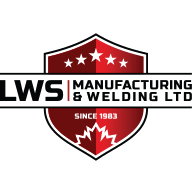Understanding the Different Types of Welding
At LWS Manufacturing & Welding, we understand that for those venturing into the world of welding, understanding the different types of welding techniques is essential. Each method offers unique advantages and applications, making the choice dependent on the specific needs of a project. This guide aims to demystify the different types of welding, providing beginners and seasoned professionals alike with the knowledge to make informed decisions, optimize their work, and explore new possibilities in metal fabrication.
Learn some important welding safety measures.
MIG Welding (Metal Inert Gas)
Gas Metal Arc Welding (GMAW) or MIG welding is a versatile and widely used arc welding process. It involves a continuous wire feed that acts as both the electrode and filler material, forming strong and uniform welds. MIG welding is perfect for automotive repairs, construction, and manufacturing due to its speed and reliability.
Advantages of MIG Welding:
- Fast welding process
- Produces clean and high-quality welds
- Ideal for welding a variety of metals, including steel, stainless steel, and aluminum
TIG Welding (Tungsten Inert Gas)
Gas Tungsten Arc Welding (GTAW) or TIG welding uses a non-consumable tungsten electrode to produce a weld. This welding technique is renowned for its precision and ability to produce high-quality, clean welds. This method is ideal for critical applications such as aerospace, piping systems, and food-grade stainless steel welding.
Advantages of TIG Welding:
- High precision and control
- Produces strong, clean welds
- Suitable for welding thin materials
Stick Welding (Shielded Metal Arc Welding)
Shielded Metal Arc Welding (SMAW) or stick welding is one of the most common types of welding. Commonly used in construction, repair work, and heavy equipment maintenance, stick welding uses a consumable electrode coated in flux to lay the weld and is favored for its simplicity and effectiveness in harsh conditions.
Advantages of Stick Welding:
- Excellent for outdoor work
- Works well on rusty or dirty metals
- Simple and versatile
Flux-Cored Arc Welding (FCAW)
While Flux-Cored Arc Welding (FCAW) is similar to MIG welding, it uses a special tubular wire filled with flux. This makes it suitable for outdoor work and welding thick materials. FCAW is often used in shipbuilding, heavy equipment manufacturing, and construction due to its high productivity and capability to weld thick sections.
Advantages of FCAW:
- High deposition rate
- Can be used in windy conditions
- No need for external shielding gas
Understanding the different types of welding is crucial for selecting the right method for your specific project. At LWS Manufacturing & Welding, we cater to all your welding needs with our comprehensive services. For expert welding and metal fabrication, contact us today at 604-746-4066. Let us help you achieve exceptional results with our professional welding services.




